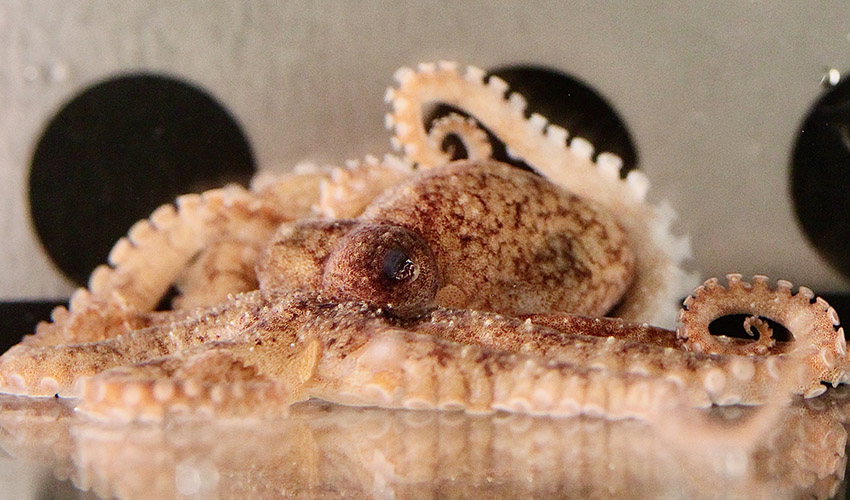Associate professor of Biology wins grant to study groundbreaking neuroscience

Bock's pygmy octopus (Octopus bocki), one of the species Associate Professor Robyn Crook studies. Photo courtesy of Robyn Crook.
The $1.5-million grant will support innovative neuroscience research and student research opportunities

San Francisco State University Associate Professor of Biology Robyn Crook has been named an Allen Distinguished Investigator (ADI) by The Paul G. Allen Frontiers Group, a division of the Allen Institute. Crook is among 23 of this year’s honorees and is slated to receive $1.5 million over the next three years for innovative early-stage research. She is the first California State University (CSU) faculty member to win the award since its inception in 2010.
“I’m incredibly excited and delighted to be selected for this award. It’s very prestigious and it gives us so much scope to do research that we wouldn’t otherwise be able to do just because we’re limited by how expensive the technology is,” Crook said. “Having the resources from the foundation really allows us to push [neuroscience] into a new direction.”
An evolutionary biologist and behavioral neuroscientist, Crook and her lab use cephalopods (squids, octopus and cuttlefish) to study the evolution of the brain circuits that control movement. However, using cephalopods is out of the norm, Crook explained. Neuroscience tends to focus on vertebrate brains — brains that are similar to humans — and though these studies are important, it leaves a void in our understanding of different types of brains and how they develop.
“[Cephalopods] are the only invertebrate lineage that have incredibly complex brains somewhat rivaling the complexity of some vertebrate brains,” noted Crook, who won an NSF CAREER award last year. “When we want to ask questions about fundamental organizing principles of complex brains, having [cephalopod brains] as a parallel complex lineage is really important.”
Whereas mammalian neurons are concentrated in the brain, cephalopods spread their neurons throughout the body. Octopuses allocate many neurons to their arms, for example, meaning their arms have the capacity to function without input from the brain. Because cephalopods are so unique, it has been difficult to adapt many standard neuroscience techniques to these animals, and research has been limited. Using the ADI award, Crook wants to build new techniques that apply new technologies to establish a comprehensive map all of the neural connections (known as a connectome) in the octopus arm and capture real-time data about how they sense and move in their environment.
But at a school like San Francisco State, this funding will lead to more than just innovative research, added Crook. In addition to funding more undergraduate and graduate researchers in her lab, Crook’s ADI award will support an educational citizen-science project for undergraduates. The connectome project will produce an immense amount of data that needs to be analyzed. Crook wants to use this as an opportunity to give University students a taste of real research.
“Wouldn’t it be amazing if 200 people all participated in building the octopus arm connectome?” she said.
Her plan is to have students help capture the shape of cephalopod neurons that are produced from imaging experiments. It is a perfect short-term project for an early-stage student because they don’t need to come in with prior neuroscience knowledge or lab training. Crook hopes it will act as an easy entry point for students to engage in research and get them excited to pursue additional science and research opportunities.
“I don’t want to just be a researcher,” she said. “I want to be able to train students in the lab, I want to be able to teach in the classroom. The impact of that type of work is so much broader than what we can achieve just as researchers most of the time.”
Learn more about SF State’s Biology department.